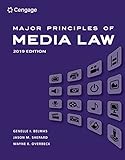Major principles of media law / Genelle I. Belmas, Jason M. Shepard, Wayne E. Overbeck.
By: Belmas, Genelle I
Language: English Publisher: Boston, MA : Cengage, 2019Description: xix, 660 pages : illustrations ; 24 cmContent type: text Media type: unmediated Carrier type: volumeISBN: 9780357113127Subject(s): Mass media -- Law and legislation -- United States | Freedom of information -- United StatesDDC classification: 343.73099| Item type | Current location | Home library | Call number | Status | Date due | Barcode | Item holds |
|---|---|---|---|---|---|---|---|
 BOOK
BOOK
|
COLLEGE LIBRARY | COLLEGE LIBRARY SUBJECT REFERENCE | 343.73099 B4179 2019 (Browse shelf) | Available | CITU-CL-49571 |
Genelle Belmas is Associate Professor at the William Allen White School of Journalism and Mass Communications at the University of Kansas. In 2002 she received her Ph.D. in mass communications with an emphasis in media law from the University of Minnesota, where her dissertation examined then-emerging issues in the areas of libel, hate speech, and pornography law as applied to the Internet. She has taught media law for more than 10 years to thousands of students. Her research interests include flag display and desecration law, indecency regulation, intellectual property, scholastic journalism issues, and the connection between media ethics and law. Her research has appeared in such journals as COMMUNICATIONS LAW AND POLICY, FEDERAL COMMUNICATIONS LAW JOURNAL, and the SOUTH CAROLINA LAW REVIEW. She is a member of the Society of Professional Journalists and the American Bar Association, where she participates in the communications law and intellectual property sections. In 2010, Dr. Belmas assumed primary authorship of MAJOR PRINCIPLES OF MEDIA LAW.
Wayne Overbeck is Professor of Communications, Emeritus, at California State University, Fullerton. Professor Overbeck earned his Ph.D. at UCLA and his J.D. at Loyola Law School. He passed the California bar exam in 1975. In addition to practicing law in California and Washington, D.C., he is a longtime professor and prolific writer. With more than 35 years of teaching experience and expertise as a practicing attorney, he continues to be an authority in the field of media law. Dr. Overbeck has also written several other books and taught on other campuses.
1. The American Legal System.
2. The Legacy of Freedom.
3. Modern Prior Restraints.
4. Libel and Slander.
5. The Right of Privacy.
6. Copyrights and Trademarks.
7. Fair Trial-Free Press Conflicts.
8. Newsgatherer's Privilege.
9. Freedom of Information.
10. Obscenity and the Law.
11. Regulation of Electronic Media.
12. Media Ownership Issues.
13. Advertising and the Law.
14. Freedom of the Student Press.
Current through the most recent Supreme Court term, MAJOR PRINCIPLES OF MEDIA LAW, 2019, delivers a comprehensive summary of the latest additions, changes and developments in communication law. The text fully integrates recent developments through July--the end of the Court's 2017-18 term--and is available in August for fall classes. Reflecting the authors' experience in the courtroom and classroom, the text focuses on the issues more important to media law, while student-friendly features help you truly engage with the material. "Focus On" sidebars explore key legal issues in more depth, end-of-chapter "What should I know about my state?" features highlight key issues from your home state, and in-margin definitions of glossary terms make even the most complex topics easy to understand.
Features
Show Less
Offering the most current coverage available, MAJOR PRINCIPLES OF MEDIA LAW, 2019 delivers up-to-date developments in communication law through July--the end of the Supreme Court's 2017-18 term.
Comprehensive coverage focuses on topics critical to the study of media law.
An excellent resource for instructors, the Preface spotlights major changes since the last edition and highlights a sample of court cases covered in the text.
Refined through 29 editions, this proven, authoritative resource is popular with instructors and students alike.
A helpful Table of Cases at the beginning of the text enables instructors and students to easily reference and locate specific cases by name and page number.
End-of-chapter summaries recap key legal concepts for students to easily review.
Page margins list key terms and their definitions, ensuring thorough student understanding of even the most complex topics.
"Focus On" sidebars allow students to explore relevant legal issues and court cases in greater depth.
End-of-chapter "What should I know about my state?" features suggest what students should know about their state law.
300-399

There are no comments for this item.